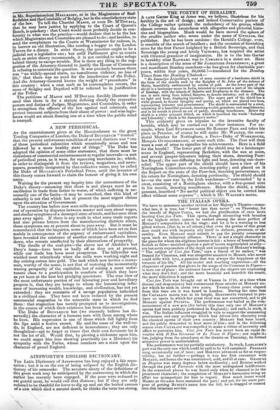A NEW PERIODICAL.
AT the entertainment given at the Mansionhouse to the great Trading Companies of London, the Duke of BUCCLEUCH " trusted " that the present unfortunate condition of several districts was "one of those periodical calamities which occasionally arose and was followed by a more healthy state of things." The Duke has adopted the opinion of some older statesmen, that there must be visitations of commercial embarrassment at regular intervals—a sort of periodical press, as it were, for squeezing merchants in ; which, in order to distinguish it from the reviews, magazines, and news- papers, generally designated by that collective name, may be called the Duke of Buccx.zuca's Periodical Press, until the inventor of this theory comes forward to claim the honour of giving it his own name.
Waiving for the present any inquiry into the correctness of the Duke's theory—assuming that there is and always must be an oscillation in trade from better to worse, of which suffering is ne- cessarily one of the limits—it may be remarked, that this kind of calamity is not that which has at present the most urgent claims upon the attention of Government. The country has before now seen mills stopping, collieries thrown out of operation by disputes between master and men about wages, and similar symptoms of a deranged state of trade, and has seen them pass away again. If there is any truth in what some trade reports and also private letters from the manufacturing districts relate, these symptoms are at present about to pass away. But it must be remembered that the inquiries, some of which have been set on foot mainly in consequence of the urgency of embarrassed capitalists, have revealed the existence of another stratum of sufferers lower down, who remain unaffected by their alternations of prosperity.
The thralls of the coal-pits—the slaves not of Aladdin's but Davy's lamp—have been as badly off as they are at present, while our trade has been most prosperous. The billyroller was wielded most relentlessly when the mills were working night and day coining cotton into gold. The task which now invites a states- man, worthy of the name, is not that of restoring the momentarily waning prosperity of the capitalist, but of raising a more unfor- tunate class to a participation in comforts of which they have as yet been at the best but grudging spectators. The true view of the most unfortunate portion of our labouring poor and hereditary paupers is, that they are beings to whom the humanizing influ- ence of increasing wealth, knowledge, and civilization, has not yet extended : they are remnants of a savage population imbedded in a civilized one. They have not been reduced by the present commercial stagnation to the miserable state in which we find them : that stagnation has merely prompted us to investigations, in the course of which their existence has been discovered.
The Duke of Buccmucs has (we sincerely believe has de-
servedly) the character of a humane man with those among whom he lives. His expression is one of those which fall lightly from the lips amid a festive crowd. He and the mass of the well-to- do, in England, are not deficient in benevolence ; they are only thoughtless—apt to forget at times that their own fortunate lot is not the lot of all. Would that, by pinning a nickname upon him, we could anger him into showing practically (as a Minister) his sympathy with the Parias, whose numbers are a stain upon the character of proud England.


























 Previous page
Previous page